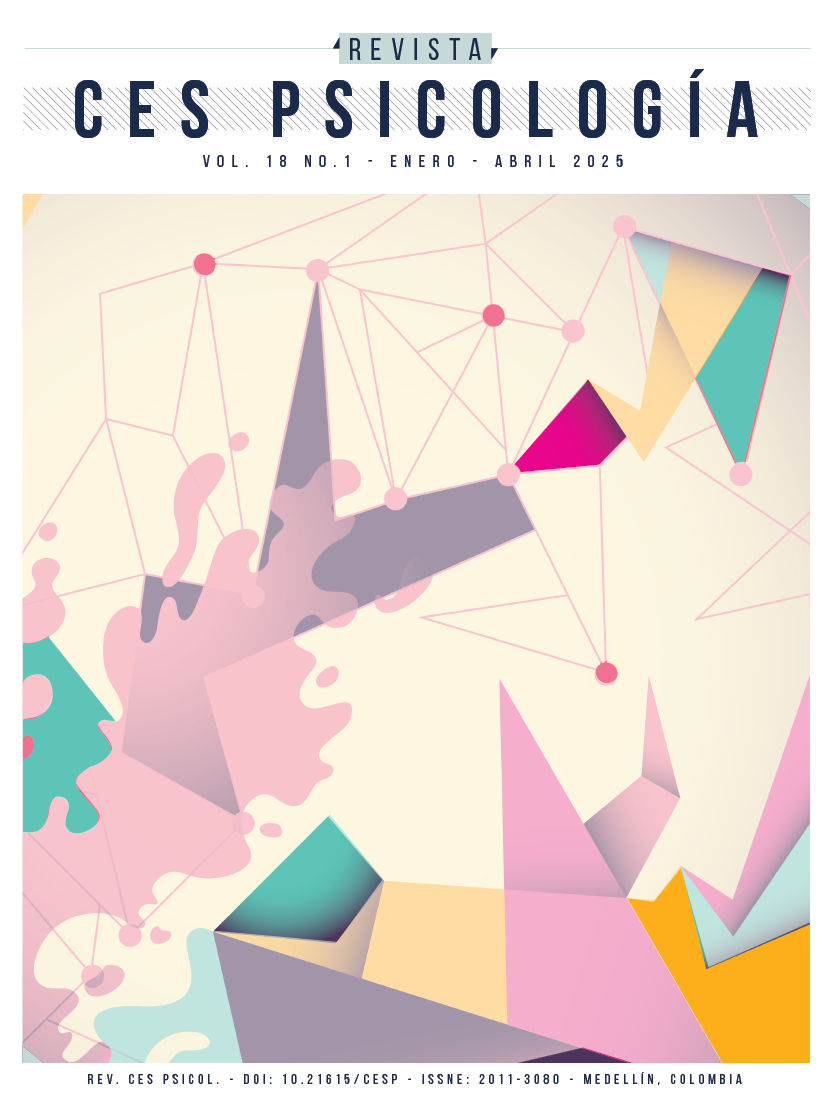Espiritualidad, calidad, y sentido de la vida: aportes al bienestar psicológico
DOI:
https://doi.org/10.21615/cesp.7353Palabras clave:
Espiritualidad, Sentido de la Vida, Bienestar PsicológicoResumen
El presente estudio presenta los impactos de la espiritualidad, el sentido de la vida y la calidad de vida con relación al bienestar psicológico total (BSP) de la población investigada. Participaron de la investigación 841 adultos (muestra de conveniencia), la mayoría del sexo femenino (70,9%), con edades comprendidas entre 18 y 86 años (M= 35,21; DE= 13,96). La recolección de datos se realizó de manera virtual, mediante un cuestionario que contenía preguntas sociodemográficas y las siguientes escalas: Cuestionario de Sentido de Vida; Escala de Bienestar Psicológico; Instrumento de Calidad de Vida (WHOQOL-Abreviado); y Instrumento de Calidad de Vida, Módulo de Espiritualidad, Religión y Creencias Personales-WHOQOL-SRPB. Se llevaron a cabo análisis de regresión lineal múltiple, cuyos resultados indican que cada dimensión del BEP se ve afectada por diferentes variables. Los más comunes en todas las dimensiones son: Dominio psicológico del WHOQOL, que explica directamente las seis dimensiones; y el dominio físico de WHOQOL, que explica directamente cuatro de las seis dimensiones. La puntuación total de Espiritualidad fue un predictor significativo de cuatro de las seis dimensiones del BEP, mientras que al menos una de las dos dimensiones del significado de la vida contribuyó significativamente a cinco dimensiones del BEP. Los datos del estudio demostraron importantes contribuciones de los fenómenos investigados al funcionamiento saludable de los individuos, confirmando resultados de otras investigaciones científicas y brindando apoyo para nuevos estudios.
Descargas
Referencias bibliográficas
Aquino, T. A. A. de. (2009). Atitudes e Intenções de Cometer o Suicídio: seus Correlatos Existenciais e Normativos [Tese de Doutorado]. Universidade Federal da Paraíba e Universidade Federal do Rio Grande do Norte. https://vitaalere.com.br/download/ATITUDES%20E%20INTENC%CC%A7O%CC%83ES%20DE%20COMETER%20O%20SUICI%CC%81DIO-%20SEUS%20CORRELATOS%20EXISTENCIAIS%20E%20NORMATIVOS.pdf
Aquino, T. A. A. de. (2021). Religião, espiritualidade e saúde: um olhar da logoterapia. Revista Horizonte, 19 (60), 1041-1056. https://doi.org/10.5752/P.2175-5841.2021v19n60p1041
Aquino, T. A. A. de, Correia, A. P. M., Marques, A. L. C., Souza, C. G. de, Freitas, H. C. de A., & Araújo, I. F. de. (2009). Atitude religiosa e sentido da vida: um estudo correlacional. Psicologia: Ciência e Profissão, 29(2), 228-243. https://dx.doi.org/10.1590/S1414-98932009000200003
Barton, Y. A., & Miller, L. (2015). Spirituality and positive psychology go hand in hand: An investigation of multiple empirically derived profiles and related protective benefits [Espiritualidade e psicologia positiva andam de mãos dadas: uma investigação de vários perfis empiricamente derivados e benefícios de proteção relacionados]. Journal of Religion and Health, 54(3), 829-843. https://dx.doi.org/10.1007/s10943-015-0045-2
Boullion, G. Q., Pavlacic, J. M., Schulenberg, S. E., Buchanan, E. M., & Steger, M. F. (2020). Meaning, social support, and resilience as predictors of posttraumatic growth: A study of the Louisiana flooding of August 2016. American Journal of Orthopsychiatry, 90(5), 578–585. https://doi.org/10.1037/ort0000464
Brouzos, A., Vassilopoulos, S. P., & Boumpouli, C. (2016). Adolescents’ subjective and psychological well-being: The role of meaning in life [Bem-estar subjetivo e psicológico dos adolescentes: o papel do sentido na vida]. Hellenic Journal of Psychology, 13(3), 153–169.
Conselho Nacional de Saúde (2012). Resolução nº 466, de 12 de Dezembro de 2012. https://www.gov.br/conselho-nacional-de-saude/pt-br/acesso-a-informacao/legislacao/resolucoes/2012/resolucao-no-466.pdf/view
Contini, M. L. J. (1998). Psicólogo e a Promoção de saúde na Educação (Dissertação de Mestrado). Faculdade de Educação da Universidade Estadual de Campinas. https://www.fe.unicamp.br/alle/teses_dissert_tcc/maria_lourdes_contini-d.html
Damásio, B. F., Melo, R. L. P., & Silva, J. P. (2013). Sentido de Vida, Bem-Estar Psicológico e Qualidade de Vida em Professores Escolares. Paidéia, 23(54), 73–82. https://dx.doi.org/10.1590/1982-43272354201309
Dewitte, L., Vandenbulcke, M., Schellekens, T., & Dezutter, J. (2021). Sources of well-being for older adults with and without dementia in residential care: relations to presence of meaning and life satisfaction. Aging and Mental Health, 25(1), 170-178. https://doi.org/10.1080/13607863.2019.1691144
Fleck, M. P. A., Louzada, S., Xavier, M., Chachamovich, E., Vieira, G., Santos, L., & Pinzon, V. (2000). Aplicação da versão em português do instrumento abreviado de avaliação da qualidade de vida “WHOQOL-bref.”. Revista de Saúde Pública, 34(2), 178–183. https://www.scielosp.org/pdf/rsp/2000.v34n2/178-183/pt
Frankl, V. E. (2016). A vontade de sentido: fundamentos e aplicações da logoterapia. São Paulo: Paulus.
Frankl, V. E. (2018). Em busca de sentido. Petrópolis: Vozes.
García-Alandete, J., Rosa Martínez, E., Sellés Nohales, P., & Soucase Lozano., B. (2018). Meaning in Life and Psychological Well-Being in Spanish Emerging Adults. Acta Colombiana de Psicología, 21(1), 206-216. http://www.dx.doi.org/10.14718/ACP.2018.21.1.9
García-Alandete, J. (2015). Does Meaning in Life Predict Psychological Well-Being? An Analysis Using the Spanish Versions of the Purpose-In-Life Test and the Ryff’s Scales. The European Journal of Counselling Psychology, 3(2), 89–98. http://doi.org/10.5964/ejcop.v3i2.27
Hadden, B. W., & Smith, C. V. (2019). I gotta say, today was a good (and meaningful) day: daily meaning in life as a potential basic psychological need. Journal of Happiness Studies, 20, 185-102. https://doi.org/10.1007/s10902-017-9946-y
Haugan, G., & Dezutter, J. (2021). Meaning-in-life: a vital salutogenic resource for health. Em: G. Haugan & M. Eriksson (Eds.). Health Promotion in Health Care – Vital theories and research (pp. 85-101). Springer. https://doi.org/10.1007/978-3-030-63135-2_8
Li, J-B., Dou, K., & Liang, Y. (2021). The relationship between presence of meaning, search for meaning, and subjective well-being: a three-level meta-analysis based on the Meaning in Life Questionnaire. Journal of Happiness Studies, 22, 467-489. https://doi.org/10.1007/s10902-020-00230-y
Li, J., Salcuni, S., & Delvecchio, E. (2019). Meaning in life, self-control and psychological distress among adolescents: A cross-national study. Psychiatry Research, 272, 122-129. https://doi.org/10.1016/j.psychres.2018.12.033
Machado, W. L, Bandeira, D. R., & Pawlowski, J. (2013). Validação da Psychological Well-Being Scale [Escala de Bem-Estar Psicológico] em amostra de estudantes universitários. Avaliação Psicológica, 12(2), 263-272. http://pepsic.bvsalud.org/pdf/avp/v12n2/v12n2a17.pdf
Moreira-Almeida, A., Lotufo, F., Neto., & Koenig, H. G. (2006). Religiousness and mental health: A review [Religiosidade e saúde mental: uma revisão]. Revista Brasileira de Psiquiatria, 28(3), 242–250. http://dx.doi.org/10.1590/S1516-44462006005000006
Nieminen, P. (2022). Application of Standardized Regression Coefficient in Meta-Analysis. BioMedInformatics, 2(3), 434-458. https://doi.org/10.3390/biomedinformatics2030028
Panzini, R. G., Maganha, C., Rocha, N. S., Bandeira, D., & Fleck, M. P. A. (2011). Validação brasileira do Instrumento de Qualidade de Vida / espiritualidade, religião e crenças pessoais. Revista Saúde Pública, 45(1), 153–165. https://doi.org/10.1590/S0034-89102011000100018
Ryan, R. M., & Deci, E. L. (2001). On Happiness and Human Potentials: A Review of Research on Hedonic and Eudaimonic Well-Being [Felicidade e potenciais humanos: uma revisão da pesquisa sobre o bem-estar hedônico e eudaimônico]. Annual Review of Psychology, 52(1), 141–166. http://dx.doi.org/10.1146/annurev.psych.52.1.141
Ryff, C. D. (2014). Psychological Well-Being Revisited: advances in the science and practice of Eudaimonia [Bem-estar psicológico revisitado: avanços na ciência e na prática da Eudaimonia]. Psychotherapy and Psychosomatics, 83, 10-28. https://dx.doi.org/10.1159/000353263
Ryff, C. D., Singer, B. H., & Love, G. D. (2004). Positive health: connecting well-being with biology. Philosophical Transactions of the Royal Society B: Biological Sciences, 359(29), 1383-1394. https://dx.doi.org/10.1098/rstb.2004.1521
Seibel, B. L., Poletto, M., & Koller, S. H. (Orgs.). (2016). Psicologia positiva: teoria, pesquisa e intervenção. Juruá Editora.
Shakarian, A., Maroufi, Y., & Nateghi, F. (2021). The Structural Equation Modeling of the Relationship Between Spirituality and Psychological Well-being Mediated by Spiritual Health. Health, Spirituality and Medical Ethics Journal, 8(2), 123-132. https://doaj.org/article/6e5e62fe05aa4479bec5dabdc6b9d182
Silva, A. B., & Guerra, V. M. (2024). Espiritualidade e sentido de vida: correlatos sociodemográficos. Psicologia em Pesquisa, 18, e37757. http://doi.org/10.34019/1982-1247.2024.v18.37757
Singh, K., & Junnarkar, M. (2015). Correlates and predictors of positive mental health for school going children. Personality and Individual Differences, 76, 82–87. http://dx.doi.org/10.1016/j.paid.2014.11.047
Steger, M. F. (2022). Meaning in life is a fundamental protective factor in the context of psychopathology. World Psychiatry, 21(3), 389-390. https://doi.org/10.1002/wps.20916
Steger, M. F., Frazier, P., Oishi, S., & Kaler, M. (2006). The meaning in life questionnaire: Assessing the presence of and search for meaning in life [Questionário de Sentido de vida: avaliando presença e busca de sentido]. Journal of Counseling Psychology, 53(1), 80 -93. https://doi.org/10.1037/0022-0167.53.1.80
Steger, M. F., Oishi, S., & Kashdan, T. B. (2009). Meaning in life across the life span: Levels and correlates of meaning in life from emerging adulthood to older adulthood. The Journal of Positive Psychology, 4(1), 43–52. https://doi.org/10.1080/17439760802303127
van Dierendonck, D., & Lam, H. (2023). Interventions to enhance eudaemonic psychological well-being: A meta-analytic review with Ryff’s Scales of Psychological Well-being. Applied Psychology: Health and Well-being, 15, 594-610. https://doi.org/10.1111/aphw.12398
van Dierendonck, D., & Mohan, K. (2006). Some thoughts on spirituality and eudaimonic well-being [Algumas reflexões sobre espiritualidade e bem-estar eudaimônico]. Mental Health, Religion e Culture, 9(3), 227-238. https://dx.doi.org/10.1080/13694670600615383
World Health Organization, (1994). The Development of the World Health Organization Quality of Life Assessment Instrument (the WHOQOL) [O Desenvolvimento do Instrumento de Avaliação da Qualidade de Vida da Organização Mundial da Saúde-WHOQOL]. In J. Orley & W. Kuyken (Eds.), Quality of Life Assessment: International Perspectives (pp. 41–57). https://doi.org/10.1007/978-3-642-79123-9_4
World Health Organization, (1998a). WHOQOL and spirituality, religiousness and personal beliefs-SRPB [Instrumento de Qualidade de Vida, Módulo Espiritualidade, Religião e Crenças Pessoais-WHOQOL-SRPB. O Desenvolvimento do Instrumento de Avaliação da Qualidade de Vida da Organização Mundial da Saúde (o WHOQOL)]. Report on WHO Consultation. Geneva: 1998. (WHO/MSA/MHP/98.2, 2-23). https://apps.who.int/iris/bitstream/handle/10665/70897/W?sequence=1
World Health Organization. (1998b). The World Health Organization Quality of Life Assessment (WHOQOL): Development and general psychometric properties [Avaliação da Qualidade de Vida da Organização Mundial da Saúde (WHOQOL): Desenvolvimento e propriedades psicométricas gerais]. Social Science and Medicine, 46, 1585–1596. https://doi.org/10.1016/S0277-9536(98)00009-4
Whoqol Group. (1998). Development of the World Health Organization WHOQOL-BREF quality of life assessment. Psychological Medicine, 28(3), 551–558. https://doi.org/10.1017/S0033291798006667
Wnuk, M., & Marcinkowski,J. T. (2014). Do Existential Variables Mediate Between Religious-Spiritual Facets of Functionality and Psychological Wellbeing. Journal of Religion and Health, 53, 56–67. https://doi.org/10.1007/s10943-012-9597-6
Publicado
Cómo citar
Número
Sección
Licencia
Derechos de autor 2024 Valeschka Martins Guerra, Andreia Barbosa da Silva

Esta obra está bajo una licencia internacional Creative Commons Atribución-NoComercial-CompartirIgual 4.0.
Revista CES Psicología ISSN 2011 3080
Facultad de Psicología, Universidad CES Primera edición 2008. Última actualización Mayo 29 de 2024. Todos los derechos reservados. Hecho el depósito legal que exige la ley.
Se autoriza la reproducción total o parcial de los artículos citando la fuente y el autor. This publication may be reproduced by mentioning the source and the authors.



